The Essential Guide to Waste Handling: Best Practices for Efficient and Sustainable Management
Date Posted:24 September 2024
By implementing best practices such as developing a waste management plan, segregating waste, and using appropriate containers, you can enhance efficiency, ensure compliance, and contribute to environmental sustainability.
Effective waste handling is a critical aspect of maintaining a clean, safe, and environmentally responsible work site. Proper management of waste not only ensures compliance with regulations but also contributes to sustainability and operational efficiency. In this guide, we'll explore key strategies and equipment for handling waste effectively, focusing on best practices for different types of waste and the benefits of adopting a comprehensive waste management approach.
Key Strategies for Effective Waste Handling
- Develop a Waste Management Plan: A well-structured waste management plan outlines procedures for the collection, segregation, storage, and disposal of waste. This plan should address the types of waste generated on-site, establish protocols for handling different materials, and set goals for reducing waste and increasing recycling rates. Regularly review and update the plan to ensure it remains effective and compliant with current regulations.
- Segregate Waste at Source: Segregation involves separating waste into different categories, such as general waste, recyclables, hazardous materials, and organic waste. Proper segregation helps streamline the disposal process, improves recycling rates, and ensures that hazardous materials are handled safely. Provide clear signage and dedicated bins or containers for each type of waste to facilitate proper segregation.
- Implement Recycling Programs: Recycling reduces the volume of waste sent to landfills and conserves natural resources. Set up recycling stations on-site for materials such as paper, cardboard, plastics, and metals. Encourage workers to recycle by providing easy access to recycling bins and educating them about the benefits of recycling. Partner with local recycling facilities to ensure that collected materials are properly processed.
- Use Appropriate Waste Containers: Choosing the right waste containers is essential for efficient waste handling. Containers should be durable, easily accessible, and suited to the type of waste being collected. Options include skip bins, wheelie bins, and compactors. For hazardous materials, use specialised containers that meet regulatory requirements and provide secure, leak-proof storage.
- Ensure Proper Waste Disposal: Dispose of waste in accordance with local regulations and best practices. For general waste, arrange regular collection and disposal services. Hazardous waste requires specialised disposal methods, such as using licensed waste management companies that can handle and process these materials safely. Avoid illegal dumping and ensure that all waste is disposed of responsibly.
- Conduct Regular Waste Audits: Waste audits involve assessing the types and quantities of waste generated on-site. Regular audits help identify areas for improvement, track progress towards waste reduction goals, and ensure compliance with regulations. Use audit findings to adjust waste management practices and enhance overall efficiency.
- Train and Educate Staff: Proper training is crucial for effective waste handling. Educate staff on waste segregation, recycling practices, and safe handling of hazardous materials. Provide ongoing training to keep workers informed about changes in regulations and best practices. Engaging staff in waste management initiatives fosters a culture of environmental responsibility.
Benefits of Effective Waste Handling
- Environmental Sustainability: Proper waste handling reduces the environmental impact of construction and industrial activities. By minimising waste generation, increasing recycling rates, and safely managing hazardous materials, you contribute to the conservation of natural resources and reduce pollution.
- Compliance with Regulations: Adhering to waste management regulations helps avoid legal issues and potential fines. Regulatory compliance demonstrates a commitment to environmental stewardship and ensures that your operations meet industry standards.
- Cost Savings: Efficient waste handling can lead to significant cost savings. Reducing waste generation and increasing recycling rates lower disposal costs and reduce the need for waste management services. Additionally, reusing or recycling materials can offset purchasing costs for new materials.
- Improved Site Safety: Proper waste management reduces hazards on-site, such as tripping hazards from discarded materials or health risks from improper handling of hazardous substances. A clean and organised site contributes to a safer work environment for all personnel.
- Enhanced Reputation: Demonstrating a commitment to effective waste management and sustainability can enhance your company's reputation. Clients and stakeholders increasingly value environmental responsibility, and a robust waste management program can be a competitive advantage.
Key Considerations for choosing Waste Handling Solutions
- Site Size and Type: Consider the size of your site and the type of waste generated when selecting waste handling equipment. Larger sites may require multiple containers or compactors, while smaller sites may only need basic bins.
- Waste Volume and Frequency: Assess the volume and frequency of waste generation to determine the appropriate size and number of containers. Regular collection and disposal services may be needed to manage high volumes of waste effectively.
- Regulatory Compliance: Ensure that waste handling equipment and procedures comply with local regulations and industry standards. This includes proper labelling, documentation, and training related to hazardous waste management.
- Ease of Use and Maintenance: Choose equipment that is user-friendly and easy to maintain. Regular maintenance ensures that containers and machinery remain in good condition and operate efficiently.



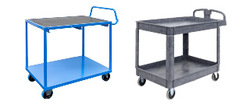
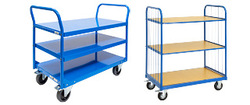
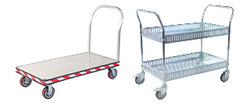
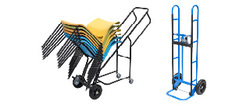
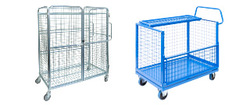
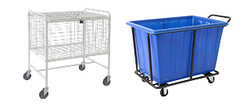
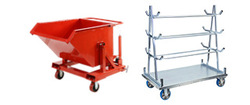
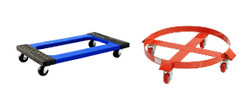
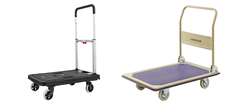
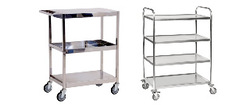
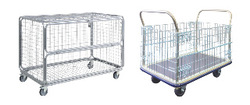
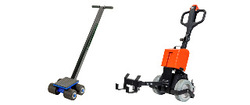
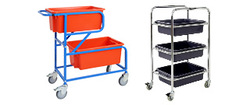
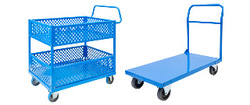
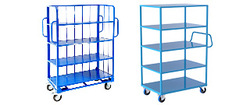
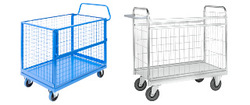
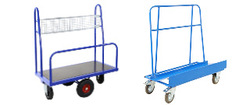
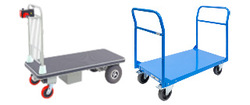
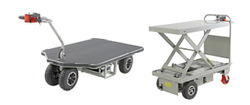
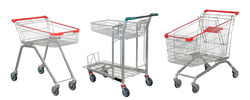
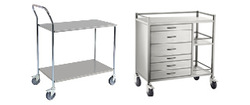
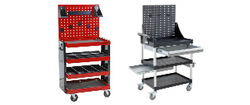
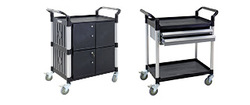
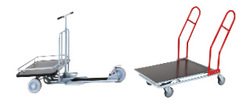
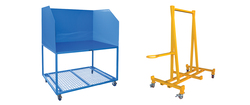



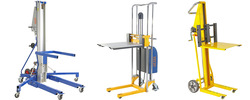



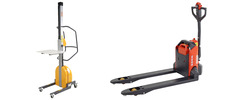
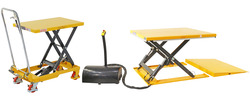
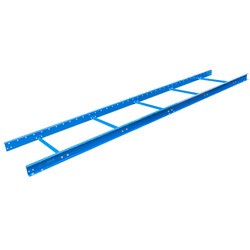
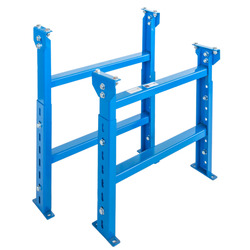
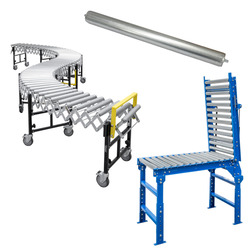
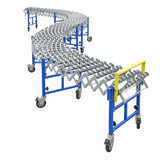


















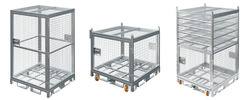

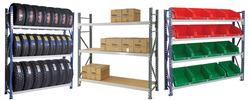
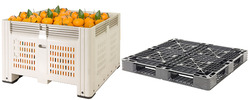
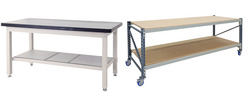
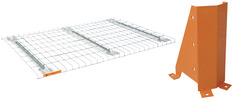
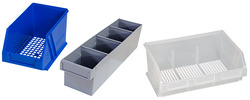

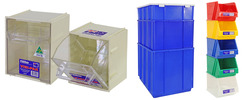

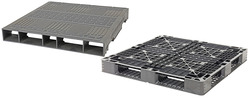

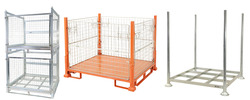
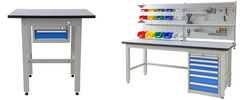
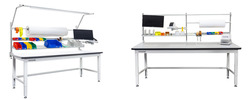


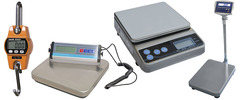



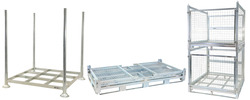
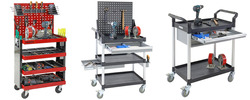
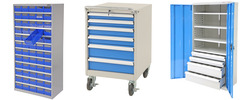
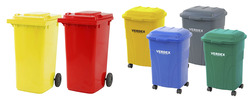
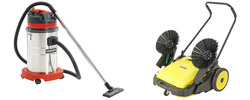











 Trolleys / Hand Trucks
Trolleys / Hand Trucks 2 Tier Trolleys
2 Tier Trolleys 3 Tier Trolleys
3 Tier Trolleys Aluminium Trolleys
Aluminium Trolleys Appliance & Hand Trucks
Appliance & Hand Trucks Cage Trolleys
Cage Trolleys Cleaning Carts & Trolleys
Cleaning Carts & Trolleys Construction Trolleys
Construction Trolleys Dollies
Dollies Foldable Trolleys
Foldable Trolleys Hospital Trolleys
Hospital Trolleys Laundry/Linen Trolleys
Laundry/Linen Trolleys Load Skates & Tow Tugs
Load Skates & Tow Tugs Mail / Office Trolleys
Mail / Office Trolleys Multi Purpose Trolleys
Multi Purpose Trolleys Multi-Tier Shelf Trolleys
Multi-Tier Shelf Trolleys Order Picking Trolleys
Order Picking Trolleys Panel Cart Trolleys
Panel Cart Trolleys Platform Trolleys
Platform Trolleys Powered Trolleys
Powered Trolleys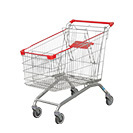 Shopping Trolleys
Shopping Trolleys Stainless Steel Trolleys
Stainless Steel Trolleys Tool Trolleys
Tool Trolleys Utility Carts
Utility Carts Warehouse Trolleys
Warehouse Trolleys Custom Trolleys
Custom Trolleys Lifting Equipment
Lifting Equipment Forklift Attachments
Forklift Attachments Jib Attachments
Jib Attachments Lifting Hoists & Pallet Hooks
Lifting Hoists & Pallet Hooks Manual Stackers & Lifters
Manual Stackers & Lifters Pallet Jacks
Pallet Jacks Pallet Lifters
Pallet Lifters Pallet Rotators & Dispenser
Pallet Rotators & Dispenser Powered Pallet Trucks & Electric Lifters
Powered Pallet Trucks & Electric Lifters Scissor Lift Trolleys and Tables
Scissor Lift Trolleys and Tables Conveyor Equipment
Conveyor Equipment Conveyor Frames
Conveyor Frames Conveyor Stands
Conveyor Stands Roller Conveyors
Roller Conveyors Skate Wheel Conveyors
Skate Wheel Conveyors Access Equipment
Access Equipment Container & Yard Ramps
Container & Yard Ramps Step Stools & Ladders
Step Stools & Ladders Work Platforms & Crane Cages
Work Platforms & Crane Cages Drum Handling
Drum Handling Drum Storage & Bunding
Drum Storage & Bunding Drum Trolleys & Lifters
Drum Trolleys & Lifters Forklift Drum Handling
Forklift Drum Handling Containment & Spillage
Containment & Spillage Aerosol Cans Storage Cages
Aerosol Cans Storage Cages Bunded Pallets & Storage
Bunded Pallets & Storage Corrosive Goods Storage Cabinets
Corrosive Goods Storage Cabinets Flammable Liquid Cabinets
Flammable Liquid Cabinets Forklift Gas Storage Cages
Forklift Gas Storage Cages Gas Cylinder Storage
Gas Cylinder Storage Site Storage
Site Storage Spill Kits
Spill Kits Stillage Cages
Stillage Cages Waste Handling
Waste Handling Bin Lifters & Tippers
Bin Lifters & Tippers Plastic Waste Bins and Carts
Plastic Waste Bins and Carts Steel Waste and Tipping Bins
Steel Waste and Tipping Bins Storage Equipment
Storage Equipment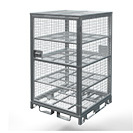 750 Series Cage Configurations
750 Series Cage Configurations Heavy Duty Cabinets & Benches
Heavy Duty Cabinets & Benches Heavy Duty Shelving
Heavy Duty Shelving Mega Bins & Pallets
Mega Bins & Pallets Packing Benches
Packing Benches Pallet Racking Accessories
Pallet Racking Accessories Parts Trays & Stor-Pak Bins
Parts Trays & Stor-Pak Bins Pegboard & Louvre Panels
Pegboard & Louvre Panels Plastic Bins
Plastic Bins Plastic Handling Solutions Bins
Plastic Handling Solutions Bins Plastic Pallets
Plastic Pallets Stack & Nest Bins
Stack & Nest Bins Storage Cages
Storage Cages Workplace Equipment
Workplace Equipment Workbenches
Workbenches Modular Workbenches
Modular Workbenches Electric Height-Adjustable Workbenches
Electric Height-Adjustable Workbenches Floor Matting
Floor Matting Industrial Weighing Scales
Industrial Weighing Scales Pallet Wrapping & Packaging Machinery
Pallet Wrapping & Packaging Machinery Ramps
Ramps Stationery Cupboards
Stationery Cupboards Storage and Stillage Cages
Storage and Stillage Cages Tool Trolleys
Tool Trolleys Tooling Cabinets
Tooling Cabinets Wheelie Bins
Wheelie Bins Workshop Equipment
Workshop Equipment Safety Equipment
Safety Equipment Gloves and PPE
Gloves and PPE Pallet Rack Post Protectors
Pallet Rack Post Protectors Safety Barriers & Bollards
Safety Barriers & Bollards Safety Knives & Cutters
Safety Knives & Cutters Signs and Traffic Supplies
Signs and Traffic Supplies Tool & First Aid Boxes
Tool & First Aid Boxes Construction Equipment
Construction Equipment Concrete Equipment
Concrete Equipment General Site Equipment
General Site Equipment Lifting Equipment
Lifting Equipment Site Storage
Site Storage Waste
Waste 











